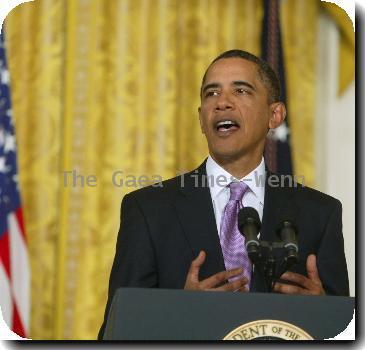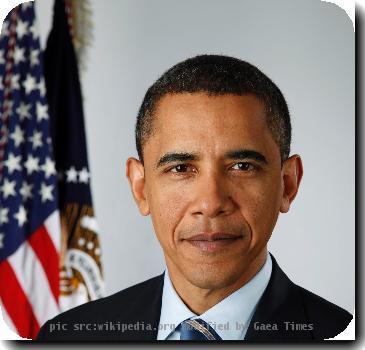Clinton says Iran acquisition of nuclear weapon could trigger Mideast arms race
By Robert Burns, APTuesday, February 16, 2010
Clinton warns of Mideast nuclear arms race
JEDDAH, Saudi Arabia — U.S. Secretary of State Hillary Rodham Clinton told Saudi college students Tuesday that if Iran gets a nuclear weapon it could trigger a nuclear arms race in the Middle East.
“Then you have all kinds of opportunity for problems that can be quite dangerous,” she said.
Clinton spoke at an all-woman college in Jeddah called Dar al-Hekma, which translates in English to “House of Wisdom.” Her appearance at the college was highly unusual in a conservative Muslim nation.
She was finishing a diplomatic visit to U.S. allies in the Persian Gulf. She had strong warnings for neighboring Iran that the world won’t accept a duplicitous attempt to develop nuclear weapons, and she said Iran is sliding into a military dictatorship. That was a new assessment for the Obama administration, which took office with a much softer tone toward Iran and a pledge to try to draw Tehran into productive talks.
Clinton ticked off a list of Iranian actions that she said violated its obligation not to pursue nuclear weapons, including construction of the Qom enrichment facility that came to light last fall.
“You have to ask yourself, ‘Why are they doing this?’” Clinton said.
Noting that Iran insists it is not pursuing the bomb, she said, “The evidence doesn’t support that.”
“Everyone who I speak with in the Gulf, including the leaders here and leaders elsewhere in the region, are expressing deep concern about Iran’s intentions,” she said.
Clinton also called Iran “the largest supporter of terrorism in the world today.”
She said the goal is to have not only a non-nuclear Iran but also an entire Middle East free of nuclear weapons.
“If Iran gets a nuclear weapon, that hope disappears,” she said, “because then other countries which feel threatened by Iran will say to themselves, ‘If Iran has a nuclear weapon, I better get one, too, in order to protect my people.’
“Then you have a nuclear arms race in the region,” she said.
Shrugging off international concerns, Iranian President Mahmoud Ahmadinejad recently announced the country was moving ahead to expand its enrichment capacities by installing more advanced machinery at its main enrichment facility — a move Iran has insisted is meant only to generate nuclear fuel.
Clinton’s departure from Saudi Arabia was delayed for hours by mechanical trouble with her government jet. Clinton planned to catch a ride to Washington aboard another jet carrying Gen. David Petraeus, who oversees U.S. military operations in the Middle East as commander of U.S. Central Command. Petraeus was nearby, in the Saudi capital of Riyadh.
A graduate of the college where Clinton had spoken, Dalai M. Khayat, said in an interview after Clinton departed she was pleased that Clinton had come, but saw some of her responses to audience members as “not that fulfilling.”
Khayat said she was a bit disappointed that Clinton had not responded fully to a student who had asked why Israel should not be forced to give up its nuclear weapons, given U.S. opposition to a nuclear Iran. Israel has not formally declared itself a nuclear power but is widely believed to have a relatively small arsenal of weapons.
Clinton had said the U.S. wants to see the entire Middle East free of nuclear weapons, but she did not mention Israel.
Khayat said Clinton’s appearance was “a huge step forward” for Saudi Arabia,” given its closed nature and social conservatism.
Clinton is an unlikely role model for Saudi women. Saudi law bars women from voting, except for chamber of commerce elections in two cities in recent years, and no woman can sit in the kingdom’s Cabinet. Women also cannot drive or travel without permission from a male guardian.
Clinton was winding up a three-day Persian Gulf visit that began Sunday in Qatar and continued in the Saudi capital of Riyadh on Monday. She was returning to Washington later Tuesday.
President Barack Obama’s chief military adviser also addressed the threat from Iran on Tuesday.
Adm. Mike Mullen, chairman of the U.S. Joint Chiefs of Staff, said a military strike to arrest Iran’s nuclear progress remains an option but that the United States prefers to see doubts about Iran’s intentions resolved through diplomacy.
U.S. warnings that a military strike could be self-defeating are meant largely to persuade Israel not to launch its own strike. On that point, Mullen said Israel is following America’s “diplomatic lead” on Iran. Mullen spoke in Jordan, following talks in Israel and elsewhere.
Associated Press writers Dale Gavlak in Amman, Jordan, and Anne Gearan in Washington contributed to this report.
Tags: Barack Obama, Geography, Iran, Israel, Jeddah, Middle East, North America, Nuclear Weapons, Riyadh, Saudi Arabia, United States, Weapons Of Mass Destruction



